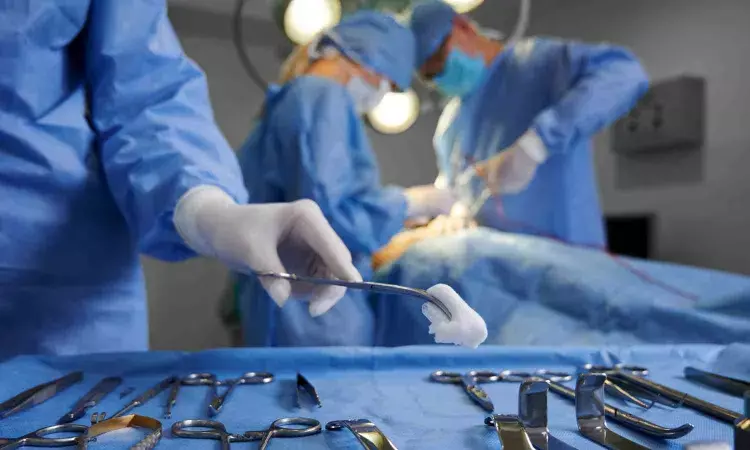- Home
- Medical news & Guidelines
- Anesthesiology
- Cardiology and CTVS
- Critical Care
- Dentistry
- Dermatology
- Diabetes and Endocrinology
- ENT
- Gastroenterology
- Medicine
- Nephrology
- Neurology
- Obstretics-Gynaecology
- Oncology
- Ophthalmology
- Orthopaedics
- Pediatrics-Neonatology
- Psychiatry
- Pulmonology
- Radiology
- Surgery
- Urology
- Laboratory Medicine
- Diet
- Nursing
- Paramedical
- Physiotherapy
- Health news
- Fact Check
- Bone Health Fact Check
- Brain Health Fact Check
- Cancer Related Fact Check
- Child Care Fact Check
- Dental and oral health fact check
- Diabetes and metabolic health fact check
- Diet and Nutrition Fact Check
- Eye and ENT Care Fact Check
- Fitness fact check
- Gut health fact check
- Heart health fact check
- Kidney health fact check
- Medical education fact check
- Men's health fact check
- Respiratory fact check
- Skin and hair care fact check
- Vaccine and Immunization fact check
- Women's health fact check
- AYUSH
- State News
- Andaman and Nicobar Islands
- Andhra Pradesh
- Arunachal Pradesh
- Assam
- Bihar
- Chandigarh
- Chattisgarh
- Dadra and Nagar Haveli
- Daman and Diu
- Delhi
- Goa
- Gujarat
- Haryana
- Himachal Pradesh
- Jammu & Kashmir
- Jharkhand
- Karnataka
- Kerala
- Ladakh
- Lakshadweep
- Madhya Pradesh
- Maharashtra
- Manipur
- Meghalaya
- Mizoram
- Nagaland
- Odisha
- Puducherry
- Punjab
- Rajasthan
- Sikkim
- Tamil Nadu
- Telangana
- Tripura
- Uttar Pradesh
- Uttrakhand
- West Bengal
- Medical Education
- Industry
Late surgical repair for preterm babies born with inguinal hernia better than early repair: JAMA

Delaying surgical inguinal hernia repair in preterm infants until after discharge from the neonatal intensive care unit (NICU) appears to reduce the likelihood of serious adverse events, according to researchers at UTHealth Houston.
A study led by first and corresponding author Martin L. Blakely, MD, MS, MMHC, professor of surgery and pediatrics with McGovern Medical School at UTHealth Houston, analyzed the safety of early versus late surgical repair for preterm infants born with an inguinal hernia. The findings were published today in the Journal of the American Medical Association (JAMA).
“The biggest question we wanted to answer was, ‘Should we let these little babies go home to grow before we repair their inguinal hernia, or should we do it now?’” Blakely said. “It’s a very common condition in preterm infants, but they also have other health concerns. If the inguinal hernia is not repaired before NICU discharge, they face health risks, but at this age they are somewhat fragile and general anesthesia can be hard on them.”
An inguinal hernia is a visible bulge in the groin area. It affects 30% of preterm infants.
Researchers conducted the first randomized clinical trial addressing this neonatal surgical question across 39 trial sites in the U.S. from September 2013 to April 2021. Of the 338 infants in the trial, 172 received early surgical repair and 166 underwent a late surgical repair.
In the early repair strategy, infants underwent inguinal hernia repair before being discharged from the NICU. In the late repair strategy, hernia repair was planned after discharge and after 55 weeks’ postmenstrual age. Postmenstrual age accounts for gestational age (weeks of development prior to birth) and age in weeks after birth. Postmenstrual age is a commonly used age measure for preterm infants according to the American Academy of Pediatrics.
Results of the trial showed a 97% probability that infants who underwent a later surgical repair experienced fewer adverse events. Researchers also found that more than 10% of the hernias in the late repair group went away, and none of these infants required surgery. Later repair also allows the infant to be discharged more quickly from the NICU.
“These findings will likely result in changes of clinical practice across the country. Until now, physicians have not had data to back up their decision to hold off on surgical repair. For years, there have been questions about what is best. Now we have solid data that later is better for most preterm infants,” Blakely said.
Reference:
HIP Trial Investigators. Effect of Early vs Late Inguinal Hernia Repair on Serious Adverse Event Rates in Preterm Infants: A Randomized Clinical Trial. JAMA. 2024;331(12):1035–1044. doi:10.1001/jama.2024.2302.
Dr Kamal Kant Kohli-MBBS, DTCD- a chest specialist with more than 30 years of practice and a flair for writing clinical articles, Dr Kamal Kant Kohli joined Medical Dialogues as a Chief Editor of Medical News. Besides writing articles, as an editor, he proofreads and verifies all the medical content published on Medical Dialogues including those coming from journals, studies,medical conferences,guidelines etc. Email: drkohli@medicaldialogues.in. Contact no. 011-43720751


